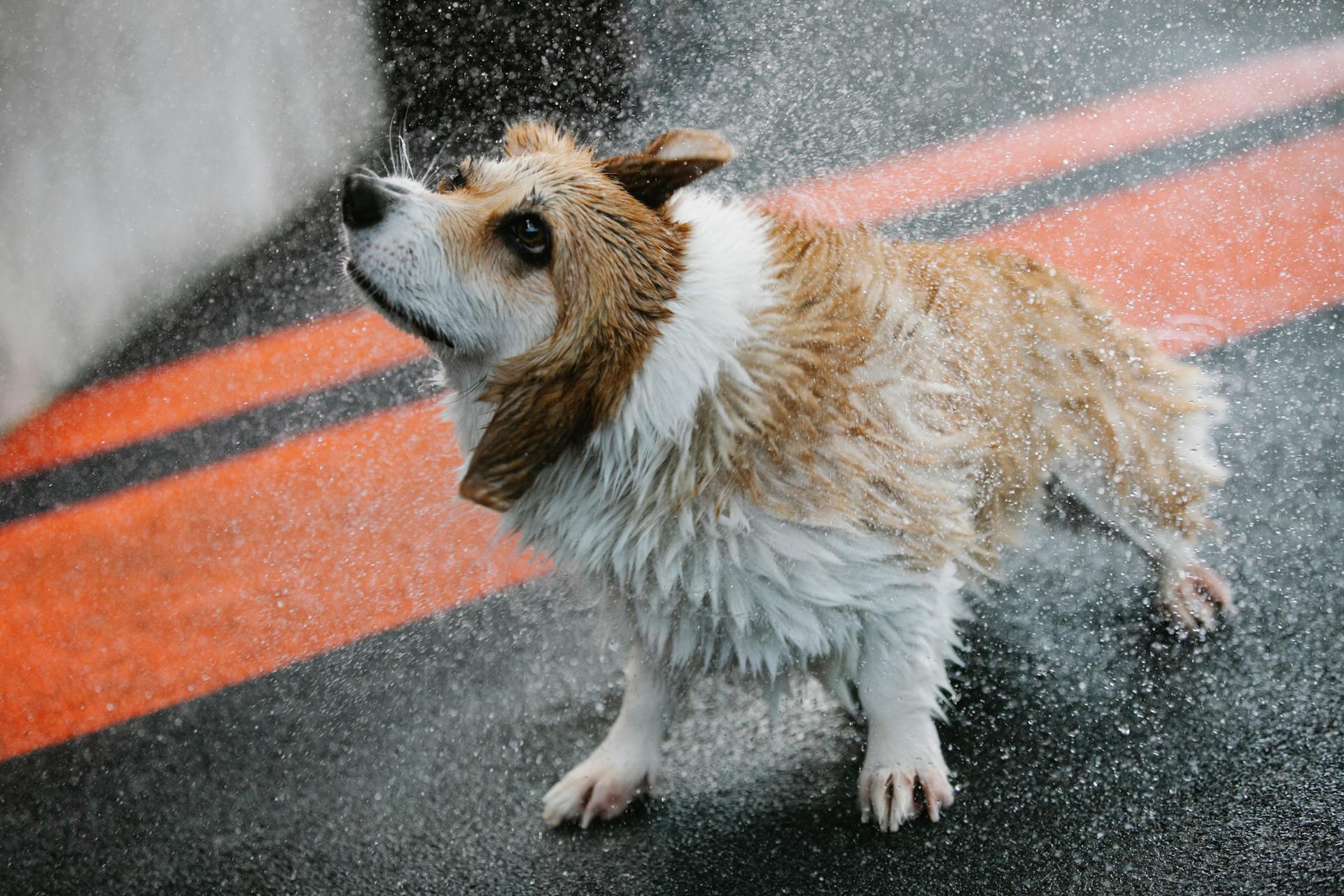
Corgis are a breed known for their short stature, but don't let their size fool you - they can be high energy dogs.
Corgis were originally bred to herd livestock, a physically demanding job that requires a lot of energy and endurance. This herding background has contributed to their high energy levels.
Corgis need regular exercise to stay happy and healthy, with at least 30 minutes of physical activity per day recommended.
Understanding Corgi Energy
Corgis are high-energy dogs, bred for herding cattle and sheep, which means they have the stamina for constant movement and agility to perform quick maneuvers.
Their daily exercise needs are crucial for them to burn off energy and remain mentally and physically healthy. Regular walks are necessary, and they thrive with a job to do.
A corgi's energy level is medium to high, requiring moderate exercise multiple times a day to prevent boredom and destructive behavior.
Here are some exercise guidelines to keep in mind:
Corgis are prone to overheating due to their thick coat, so it's essential to provide plenty of water and regular rest breaks, especially during hot weather.
Their short legs call for special considerations when doing activities, such as climbing or long runs, which can lead to back problems as they age.
Recognizing and Avoiding Overexertion
Recognizing and Avoiding Overexertion is crucial for Corgis. Their long backs and short legs make them prone to spinal issues, so any signs of discomfort during exercise should be taken seriously.
Corgis can easily overexert themselves due to their energetic nature. This can lead to serious health problems.
Pay attention to your Corgi's body language, as they may not always vocalize their discomfort. If they're panting excessively, limping, or showing signs of pain, it's time to stop exercising and give them a break.
Regular exercise is still essential for Corgis, but it's essential to balance activity with rest periods. This will help prevent overexertion and keep your Corgi happy and healthy.
You might enjoy: Do Corgis Need a Lot of Exercise
Corgi Care and Nutrition
Corgis love to eat, which can easily lead to obesity if not managed with regular exercise. A fit Corgi should have a well-defined waist and you should be able to feel their ribs without a thick layer of fat.
Corgis are prone to obesity, so it's essential to monitor their food intake and ensure they get plenty of physical activity. Regular exercise can help prevent obesity and maintain a healthy weight.
A Corgi's diet should be tailored to their individual needs, taking into account their age, size, and activity level. A well-balanced diet that includes plenty of protein and moderate amounts of fat is ideal.
Corgis are intelligent and active dogs that require regular exercise to stay happy and healthy. Aim for at least 30 minutes of exercise per day, which can include walks, runs, and playtime in the yard.
A Corgi's exercise needs may vary depending on their age and health status. Puppies, for example, need plenty of exercise to help them burn off excess energy and develop strong bones and muscles.
You might enjoy: Are Corgis Healthy
Training and Exercise
Agility training is perfect for Corgis, given their history as herding dogs. It not only exercises their body but also their mind, as they have to learn and remember the course and respond to commands quickly.
Early socialization is good for Corgis, as they tend to be naturally reserved around strangers. This trait makes them good watchdogs, but excessive fearfulness needs to be avoided.
Corgis need training to channel their energy and satisfy their craving for activities and challenges. Start with the basics, then consider training the dog to do a job, such as a watchdog or a herder.
Walks are essential for Corgis not just for the physical exercise but also for the mental stimulation they provide. Sniffing around and exploring new environments is good for their mental health and helps to satisfy their curiosity.
In hot weather, it's best to opt for early morning or late evening walks, and always have water available to prevent overheating.
For your interest: Pembroke Welsh Corgi Training
Walks in a Regimen
Including walks in your Corgi's exercise regimen is crucial for their overall health and happiness. Walks provide physical exercise for your Corgi.
Corgis need daily walks to get enough physical activity. They can get bored or develop behavioral problems if they don't receive enough physical and mental stimulation.
Herding: A Natural Fit
Herding is a natural fit for Corgis as it taps into their herding instincts. Participating in herding trials or instinct tests can be a great way for Corgis to engage in a natural and fulfilling exercise.
Corgis need physical and mental stimulation, and herding provides both. Herding is a great way to challenge your Corgi and keep them engaged.
It doesn't matter if you don't have sheep for them to herd, as participating in herding trials or instinct tests can still be beneficial.
Training
Training is crucial for Corgis, as they crave activities and challenges. Early socialization is a must, especially since they tend to be naturally reserved around strangers.
Corgis have a tendency to herd by nipping at the ankles, which can be a problem with very young children. Proper training and socialization can make all the difference, though.
Training should start with the basics, then consider teaching your Corgi a job, such as being a watchdog or a herder. If you do want your Corgi to serve as a watchdog, be aware that they have a tendency to bark a lot.
You can train your Corgi to reduce unnecessary barking, though.
Sources
- https://infinitewags.com/blogs/dog-breed-info/corgi-energy-level
- https://www.dogster.com/dog-breeds/when-will-corgi-calm-down
- https://iheartdogs.com/how-much-exercise-does-a-corgi-need/
- https://pet-orama.com/blogs/corgi-blogs/your-corgi-analyzing-their-energy-levels
- https://www.thesprucepets.com/breed-profile-pembroke-welsh-corgi-1117986
Featured Images: pexels.com


